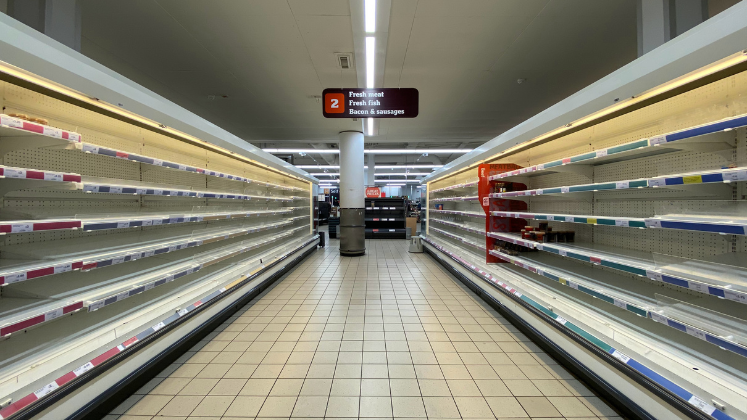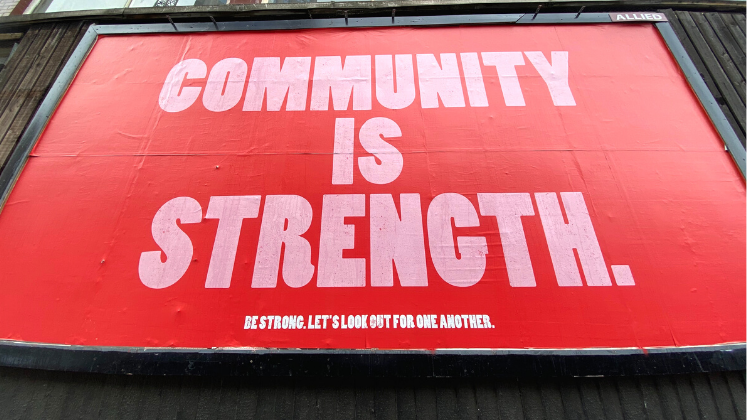In COVID-19 Collaborations: Researching Poverty and Low-Income Family Life during the Pandemic — available open access— Kayleigh Garthwaite, Ruth Patrick, Maddy Power, Anna Tarrant and Rosalie Warnock bring together contributors to explore the experiences of low-income families during the COVID-19 pandemic. This timely collection is not only an insightful reflection on the impact of the pandemic, but also a toolkit for moving forward through the next crisis, writes Rosie Hamilton.
COVID-19 Collaborations: Researching Poverty and Low-Income Family Life during the Pandemic. Kayleigh Garthwaite, Ruth Patrick, Maddy Power, Anna Tarrant and Rosalie Warnock (eds). Bristol University Press. 2022.
 There are around 14.5 million people living in poverty in the UK, and a similar number claim some form of state benefit. That’s around 22 per cent of the population. Yet this segment of society is too often viewed as a single homogeneous mass when it comes to policy decisions and public discourse. COVID-19 Collaborations takes an in-depth and personal look at the lives of some of those who fall into the ‘low-income’ category, exploring how they fared before the pandemic, through the worst of lockdown and in the period of returning to the ‘new normal’ in 2021. In doing so, the book belies the generalisations that plague public discourse on those on low incomes, and tackles head-on the truth behind the stigma this group faces.
There are around 14.5 million people living in poverty in the UK, and a similar number claim some form of state benefit. That’s around 22 per cent of the population. Yet this segment of society is too often viewed as a single homogeneous mass when it comes to policy decisions and public discourse. COVID-19 Collaborations takes an in-depth and personal look at the lives of some of those who fall into the ‘low-income’ category, exploring how they fared before the pandemic, through the worst of lockdown and in the period of returning to the ‘new normal’ in 2021. In doing so, the book belies the generalisations that plague public discourse on those on low incomes, and tackles head-on the truth behind the stigma this group faces.
The collection focuses on just one part of the broader ‘Covid Realities’ research programme – funded by the Nuffield Foundation to document the experiences of those on low incomes during the pandemic – namely, the ‘COVID-19 and Families on a Low Income: Researching Together’ collective. This collective brought together fourteen different research projects, thirteen of which were already in progress between March and June 2020, and involved over 4,000 parents and carers across the UK. Alongside conducting research, the ‘Researching Together’ collective has also made efforts to present their findings to key policymakers (3).
Editors Kayleigh Garthwaite, Ruth Patrick, Maddy Power, Anna Tarrant and Rosalie Warnock choose to split COVID-19 Collaborations into three parts. The first, ‘Social Security in the Spotlight’, includes contributions on how formal social security structures responded to COVID-19, covering the impact of social security on low-income families both before and during the pandemic. The second part, ‘Intersecting Insecurities in Action’, looks at low-income life from a variety of angles, presenting research that focuses on different family groupings, ages, cities and life experiences. Finally, Part Three, ‘Innovating in Sharing Experiences during COVID-19’, focuses on the actual nuts and bolts of the research, providing an honest look at how the pandemic (and particularly lockdowns) impacted and shaped the projects as well as the lessons we should take forward.

Image Credit: Photo by John Cameron on Unsplash
Perhaps inevitably, there is a lot of overlap between the three parts as much of the research doesn’t sit neatly into any single category. Occasionally this blurring of boundaries gives a sense that perhaps the themes were too broad to be fully helpful, but this is more a reflection of the complexity and range of the findings. Once read from start to finish, these groupings ultimately feel a sensible way to organise research that grapples with such a broad and multi-faceted issue.
And this breadth is striking. COVID-19 Collaborations covers research from across all four UK nations and tackles a wide range of demographic differences. Given this, there’s an impressive coherence to the collection. Despite the range and diversity of the research projects featured, many themes recur.
The most prominent finding is that already inadequate support for low-income families worsened during COVID-19. This may seem obvious: the pandemic made access to lots of things difficult. But the idea that the pandemic wasn’t the cause of new failings in state support for those on low incomes, but rather exacerbated problems that were already there, is a vital one. That this point is picked up by researchers across the board presents a strong picture that social security in its current form is not working. Just one example is the finding that the pandemic exposed the extent to which people had been relying on informal support, provided by family, friends or community groups, to fill in the gaps left by formal state support. Many contributing authors found that lockdown, and the removal of access to these support sources, exposed the layers of ‘hidden demand’ (35) in the system.
Interestingly, a number of the research projects were able to use the unique opportunity presented by the pandemic to test how formal support structures could work differently. In Chapter Three, for example, Rita Griffiths, Marsha Wood, Fran Bennett and Jane Millar look favourably on the removal of ‘conditionality’ rules for those on Universal Credit during the height of the pandemic. Its suspension offered an opportunity to evaluate whether this system of deciding who is ‘deserving’ of the full amount of support was fit for purpose. In Chapter Ten, Lisa Scullion, Philip Martin, Celia Hynes and David Young also point to failures with this policy through focusing on the period of ‘emergence’ from lockdown conditions. They found that the ‘jarring introduction’ of conditionality actually pushed one of their participants, Patrick, further away from engagement with paid employment, the exact opposite of the policy’s intended purpose.
Nuanced findings like these demonstrate the value of having a collection that involves ongoing and long-term research projects, rather than those specifically started during lockdown. Since the majority of these studies were already in progress, and a number are still ongoing, it’s possible to get a more accurate view of what actually changed and the lessons we should be learning policy-wise.
Unfortunately, even when we’re able to use unique periods like lockdown to test the effectiveness of policy, it’s clear there are no simple fixes. The second theme that recurs throughout the collection is the idea that there are no one-size-fits-all solutions – and continuing as if there are risks exacerbating the financial insecurity and exclusion of some of the most vulnerable in our society. Many contributing authors show how even those who may fit similar ‘categories’ could have completely different experiences, something that’s often missed in policymaking that looks for a ‘one-size-fits-most’ solution.
An example was the response to the increased reliance on digital communications during the pandemic. For those claiming benefits, lockdown meant no more job centre appointments and more online interaction. This prompted a range of reactions from claimants. The contributing authors in Chapter Two – David Robertshaw, Kate Summers, Scullion, Daniel Edmiston, Ben Baumberg Geiger, Andrea Gibbons, Jo Ingold, Robert de Vries and Young – do a good job of summing up the differences: ‘Some experienced the process as less embarrassing or stigmatising than anticipated, because they were not required to attend a physical appointment at Jobcentre Plus. The digital interface, however, worked less well for others […] many still articulated a need for in-person reassurance, timely feedback, and a clearer understanding of what was happening at various stages of their claim’ (33).
Other contributing authors pointed out that the closure of libraries and other community centres with free internet also created unexpected difficulties for those managing their benefits (188). It’s clear from the research presented in this collection that we can’t assume how people will respond to changes nor that a single approach will work for everyone – particularly when you’re designing a system to support millions of individuals.
The editorial decision to make the voices of the research participants a key part of both the research and the way it was presented means many of the contributing authors chose to include direct quotes or detailed snippets from the qualitative elements of their research. For a non-academic reader, this adds a lot of power to their findings. It can be very easy for social researchers to rely on stats and figures. While interesting in themselves, a purely quantitative approach can leave a reader feeling detached from the reality of the real people behind the data. We can be told a third of low-income households are behind on their bills. But when you read Alex’s own words – ‘Lying in bed. Tummy rumbling. Started to wait and see if daughter leaves food on plate and finish it off to save money’ (167) – this is really put into perspective.
Much of what is discussed in COVID-19 Collaborations will feel very familiar to service providers and to those who have experience of living on a low income. Many of the contributing authors are optimistic about the potential for change, but there’s a clear undertone that there’s a lot of work to be done.
While the writing of this collection was completed before the cost of living crisis really began to rear its head, this new and quickly evolving financial landscape simply serves to make this collection even more necessary as more people across the UK are set to face greater levels of financial insecurity and dependence on state support. Those who would really benefit from reading this book are policymakers and the general public, whose stigmatisation (conscious or unconscious) of those on low incomes is deeply rooted but quite detached from the reality lived by Britain’s poorest. COVID-19 Collaborations is not only an insightful reflection on the impact of the pandemic, but also a toolkit for moving forward through the next crisis.
Note: This review gives the views of the author, and not the position of the LSE Review of Books blog, or of the London School of Economics and Political Science.
Banner image credit: Photo by Volodymyr Hryshchenko on Unsplash.







